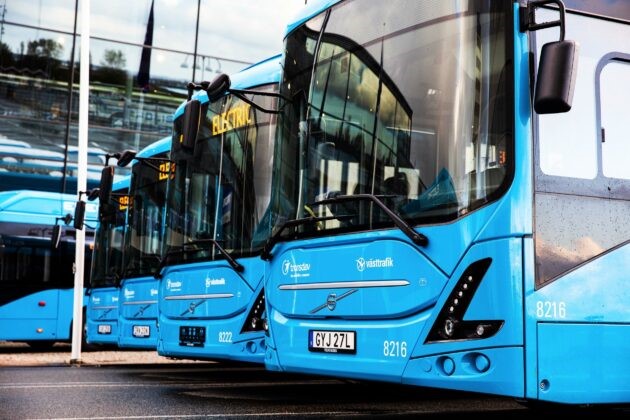Solar Taxi, a wholly Ghanaian-owned company that designs and manufactures electric vehicles in the country is in the process of supplying the State Transport Company (STC) with 100 electric buses, which are more affordable to run than diesel-fuelled buses.
CEO of STC, Nana Akomea disclosed this on Good Morning Ghana on Metro TV.
According to him, even though diesel buses and electric buses cost the same, it is more expensive to run diesel buses than electric buses, hence the decision to start adding electric buses to the STC fleet.
Nana Akomea noted that Solar Taxi currently designs and manufactures electric motorbikes and other smaller EVs in Ghana, adding that they have a foreign partner who manufactures electric buses so STC is working with them to supply the buses in collaboration with their foreign partners.
He said, as part of the contract, Solar Taxi will also build charging stations at all of STC’s rest stops across the country, supply backup batteries and also have the responsibility of regular maintenance of the buses on behalf of STC.
The STC Boss is confident that once the electric buses come on stream, it will help STC to cut cost of fuel significantly and also enable it to provide even better traveling experience for passengers.
He believes the collaboration with Solar Taxi indicates STC’s commitment to tapping on local ingenuity and also to prudent use of state resources.
Meanwhile, in a previous interview, here is what the CEO of Solar Taxi, Jorge Kwadwo Appiah said about the prudence in choosing electric vehicles over petrol/diesel vehicles in terms of cost-cutting, safety and the protection of the environment.
Huge savings
Jorge Appiah said the prices of Solar Taxi’s electric vehicles range from GH¢90,000 to GH¢300,000 depending on what the customer wants, adding that it makes better economic sense to buy a brand-new EV than to buy an imported home-used second-hand fuel/diesel car that will cost a lot of fuel to run.
“An clients choose EV over petrol/diesel cars based on the economics – because if you buy an electric vehicle today, you will be saving up to 90 per cent of what you spend on fuel every month.
“So if you spend GHC1,000 on fuel every month, EV will save you GHC900 and you will spend only GHC100 a month to run the car,” he stated.
And the savings, he said, could even get to as high as 98 per cent a month, if the car owner invests in a solar hub, where a solar charging system is mounted in your house to charge your vehicle daily.
Currently, the EV market is a young one in Ghana, and it is now picking up, but Jorge Appiah believes with government policy intervention in the areas of infrastructural support and tax rebates for both players and consumers, EVs mainstreaming can be fast-tracked.
Green energy
Jorge Appiah said Solar Taxi’s main focus is to create an affordable and environmentally friendly transportation system for Africa, such that “we will avoid the situation where we make a lot of money but can’t spend because we would have to be wearing nose masks and adopting practicing to prevent health risks due to environmental pollution.”
West African economies, he said, depend largely on transportation, such that the smallest increase in the cost of any transportation component like fuel, spare parts and others impact every sector of the economy – education, food, health and others.
So with the global drive towards stemming climate change, the dream was to find a sustainable and affordable means of transportation for the sub-region and beyond, and that was how Solar Taxi was birthed.
He said it was based on the company’s commitment to green energy that, in 2018, MasterCard came on board as a partner and provided funding for them to go commercial.
Safety
In terms of the safety of electric vehicles, Jorge Appiah said they are way safer than petrol and diesel cars because the safety measures put in electric cars have been stepped up many notches higher compared to petrol and diesel cars.
“For one, petrol is flammable but electric vehicles can hardly catch fire due to the high safety standards – EVs are just like the mobile phone in your pocket – if you do not have concerns about your mobile handset easily posing a risk then you should not have concerns about electric vehicles,” he said.
Still on safety, The Solar Taxi boss said electric vehicles have been given thorough crash tests and they often pass as safer than petrol and diesel cars, adding that for EVs “safety is the definition” and when it comes to crash test results, EVs have some of the best in the world.
Jorge Appiah believes Africa is poised to develop fast, but if care is not taken, the continent will develop by polluting the climate like the west did. But with affordable electric vehicles Africa can leapfrog its challenges and develop in an environmentally friendly manner.
Solar Taxi employs about 42 Ghanaians, out of which 60 per cent are technical staff and the rest are administrative and business staff, and they have already started receiving requests from Nigeria, Cote d’Ivoire, Burkina Faso and other parts of the sub-region.
They company also boasts of about 40% of its engineers being females, which clearly indicates they are giving the opportunity to young women pursuing STEM.
Credit: techfocus24










